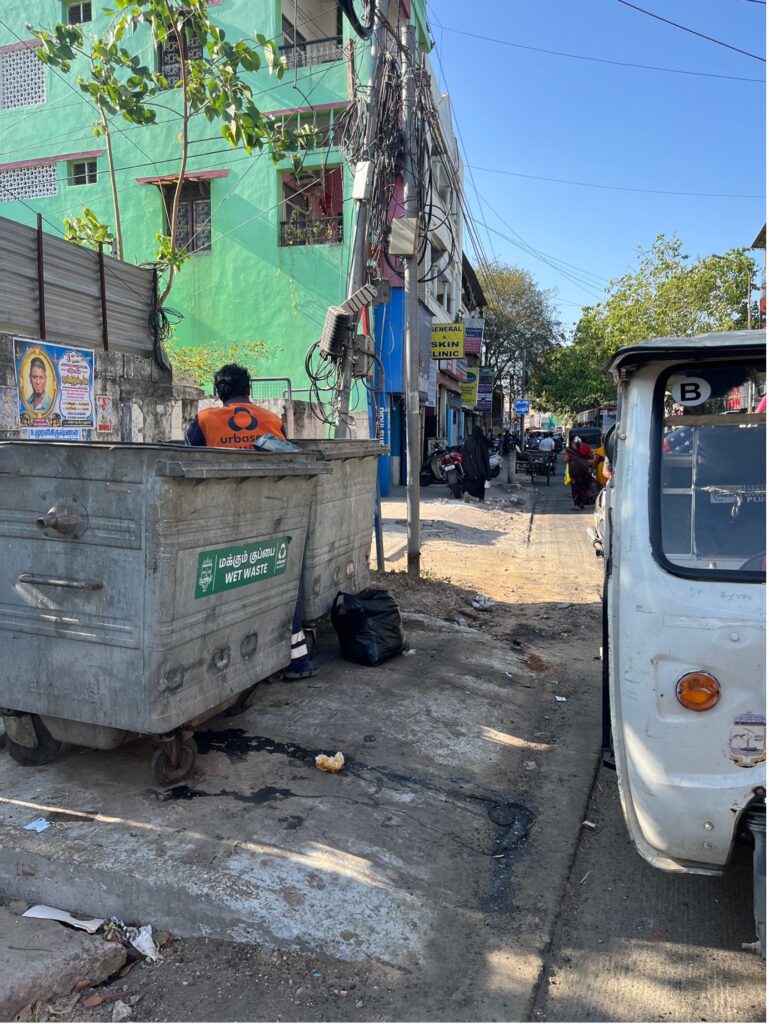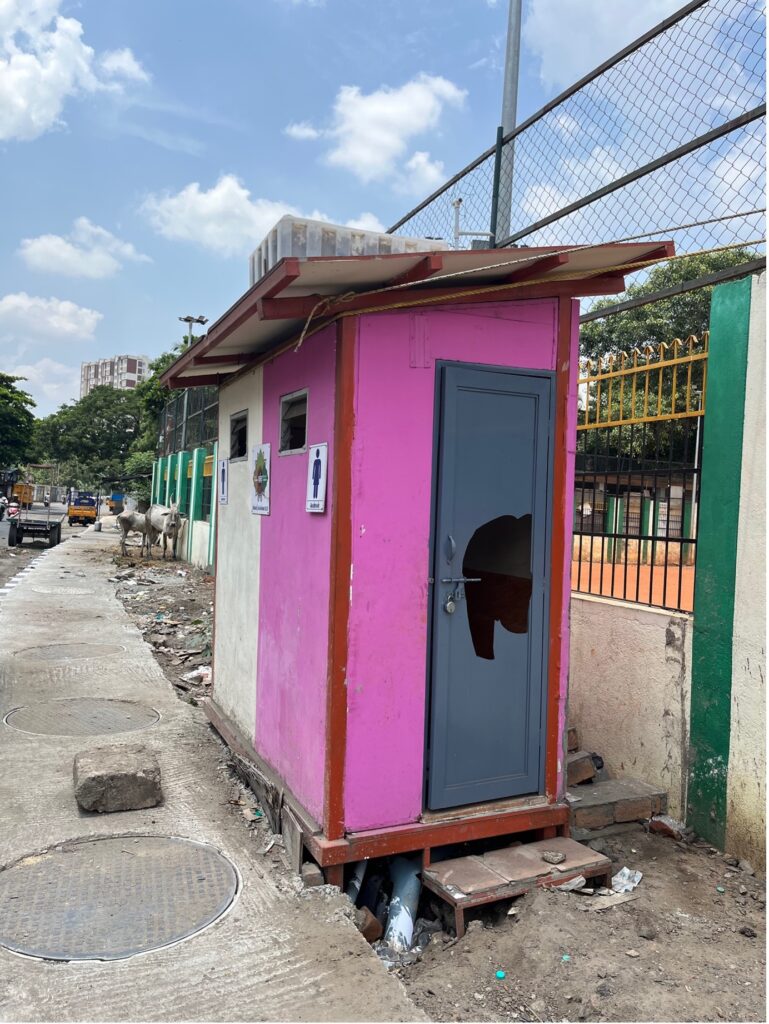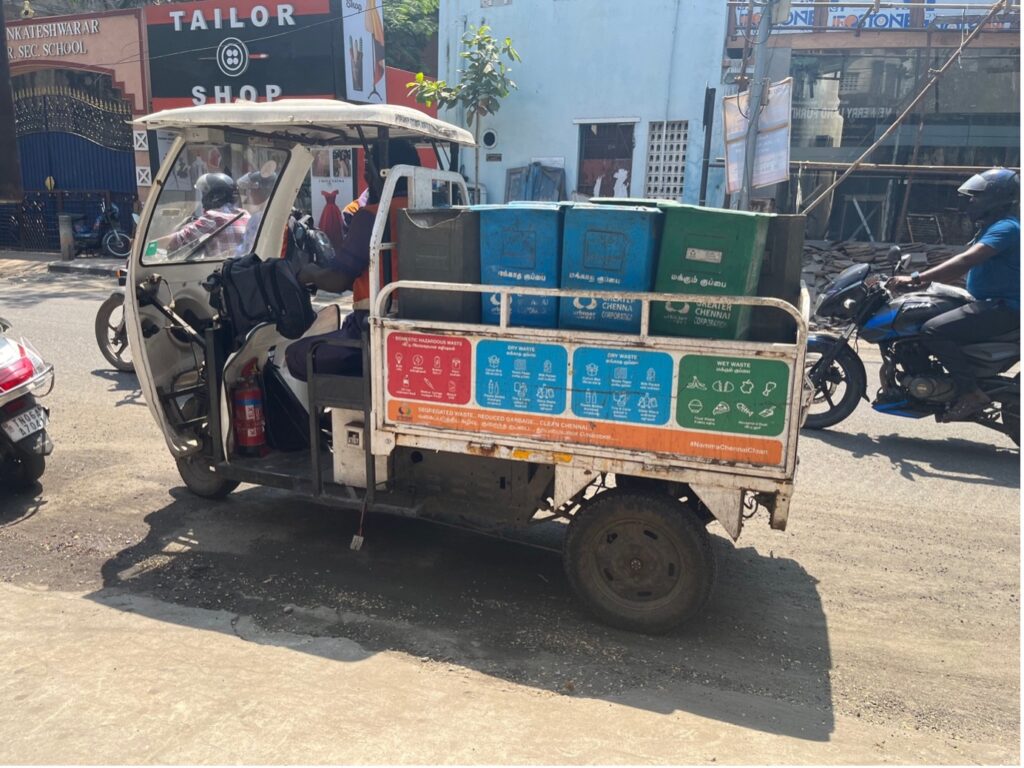The fifth National Family Health Survey notes that almost 90% of menstruating women, aged between 15-24, in urban India use hygienic menstrual products. This includes disposable sanitary pads and locally produced napkins. The increasing use of sanitary pads is essential for Menstrual Hygiene Management (MHM). At the same time, the improper disposal of used sanitary pads is a looming concern for sanitation workers.
Sanitation workers play a key role in the collection and transportation of menstrual waste in India’s urban municipalities. However, taboos around menstruation hinder their task, harm their health, and limit the public’s access to information on proper menstrual waste disposal practices.
I research sanitation systems in Chennai’s slums to understand structural violence. During fieldwork, the city’s sanitation workers brought my attention to how period taboos made their task of collecting menstrual waste challenging.

Period taboos in India
Period taboos encompass cultural norms and beliefs that often lead to the stigmatization and marginalization of menstruating women and girls. These cultural norms are built upon notions of impurity and they restrict women from participating in religious activities, entering certain spaces, and discussing menstruation openly.
To address period taboos, and create awareness on MHM, some Indian states have started distributing free sanitary pads through schools, primary healthcare centers (PHCs), and public toilets. Despite their efforts, period taboos have ensured that the cultural practice of keeping menstrual hygiene products hidden from the gaze of men and children continues.
For example, sanitary pads are still handed out in pharmacies, PHCs, and corporation schools, covered in newspapers or black plastic bags. Similarly, they are discarded in a common garbage bin wrapped in a newspaper or black plastic bag after usage. This need to conceal menstrual blood is informed by cultural norms.
To make matters worse, the sanitation infrastructure also fails to provide a safe space to discard used menstrual hygiene products.
Lack of safe space
In a society where period taboos dictate cultural norms, a safe and accessible sanitation infrastructure is crucial to mitigate the impact of menstrual stigma on menstrual waste disposal practices. However, the reality is starkly different, especially for those dependent on public toilets.
I found Chennai’s public toilets in informal settlements often decrepit – lacking doors and running water, thus rendering them uncomfortable and inconvenient to use. These facilities primarily serve the informal residents, homeless individuals, and the city’s sanitation workers. Such inadequate toilets exacerbate the challenges of an already vulnerable population during their menstruation by depriving them of private and hygienic spaces to clean and change their sanitary pads.
Compounding this issue, most public toilets lack dedicated bins to discard sanitary pads. Consequently, menstruators are compelled to discard their used pads either within the toilet booth itself or in secluded spaces nearby. This practice poses an environmental concern but also underscores the profound impact of societal attitudes toward menstruation on everyday behaviours.

Managing menstrual waste
Urban municipalities depend on sanitation workers to collect and transport the menstrual waste to their disposal sites. They follow guidelines from India’s Central Pollution Control Board (CPCB) which recommends incinerators and scientific landfills for safe disposal of used sanitary pads – as they contain harmful plastics and toxins.
Apart from adhering to the CPCB guidelines, urban municipalities also follow the waste segregation protocols outlined in the Swachh Bharat Mission Urban (SBM-U) 2.0 guidelines. These guidelines encourage sanitation workers to collect and transport segregated waste, including used menstrual hygiene products, through door-to-door collection.
Impact of period taboos on sanitation work
I observed how period taboos hurt the health and dignity of sanitation workers at three common disposal sites of used sanitary pads – public toilets, community garbage bins, and waste collection at the door.
In public toilets, female sanitation workers regularly collect discarded sanitary pads clogging the drains during their routine cleaning. Similarly, when sanitary pads are mixed with household garbage, sanitation workers sift through the street garbage bins, often without protective gear, to collect the used pads. They are later transported to incinerators and landfills in battery-operated vehicles plying through the city.
The Greater Chennai Corporation (GCC) requires the residents to wrap their used sanitary pads in newspapers and hand them over to sanitation workers who keep them in a “domestic hazardous waste” bin on their vehicles.
However, field insights and observations show that the domestic hazardous waste bin is rarely used since menstruating women must still deal with cultural taboos and the shame associated with periods when discarding sanitary pads. This is because, in most cases, the sanitation worker who comes to their door to collect their segregated waste is a man.
Thus, even if the sanitary pads are wrapped in a newspaper but still discarded along with other household waste (in dry or wet waste bins), the sanitation workers must transfer the sanitary pads to the domestic hazardous waste bin before transporting them.
To add to their troubles, a GCC supervisor informed me that each sanitation worker is mandated to collect around 2 to 5 kgs of used sanitary pads from each zone. Sanitation workers’ safety and dignity are compromised in such tonnage-focused waste mandates.
Bridging the gap
Critics may argue that GCC and its public-private partner, Urbaser Sumeet, are already educating the public on the importance of waste segregation. However, I observed their Information, Education, and Communication (IEC) activities fail to address the influence of period taboos in menstrual waste management. NGOs currently perform this important task, but their resources are limited.
To ensure effective menstrual waste management, which includes the sanitation worker’s health and dignity, policy prescriptions and current practice must consider the influence of period taboos on waste disposal behaviour.

About the author: Younus Mushtaq Ahmed is a Ph.D. candidate in Medical Anthropology at the University of British Columbia. His research focuses on development narratives within public health programs. For his Ph.D., Younus is conducting an ethnographic study of toilet politics in Chennai, India, to examine the role of sanitation infrastructure in (re)producing inequality, specifically along caste, class, and gender, in urban India. Twitter: @Younus_Ahmed06
Competing Interests: None
Handling Editor: Neha Faruqui